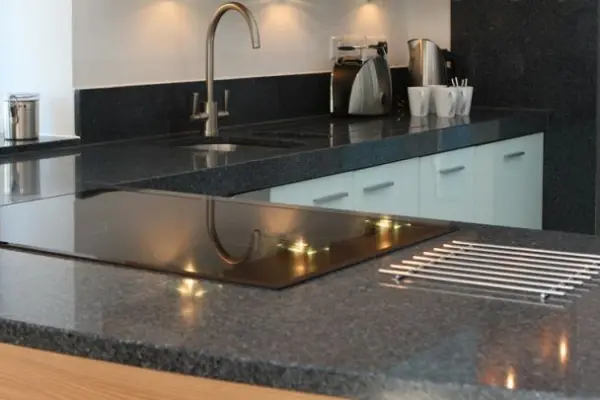In 2025, composite materials are actively displacing traditional solutions in the construction market. A kitchen countertop made of synthetic stone costs from $50 per square meter. Why are builders and designers massively switching to artificial composites?
An artificial stone countertop combines the beauty of natural material with the reliability of factory production. Like high-precision engineering structures, composite stone combines functional properties with aesthetic qualities.
Acrylic stone and quartz agglomerate dominate the market. Each material solves specific tasks. In practice working with private clients, I often notice: homeowners confuse these types of composite countertops, which leads to wrong choices and subsequent problems.
Artificial Stone Properties: Composition and Technologies
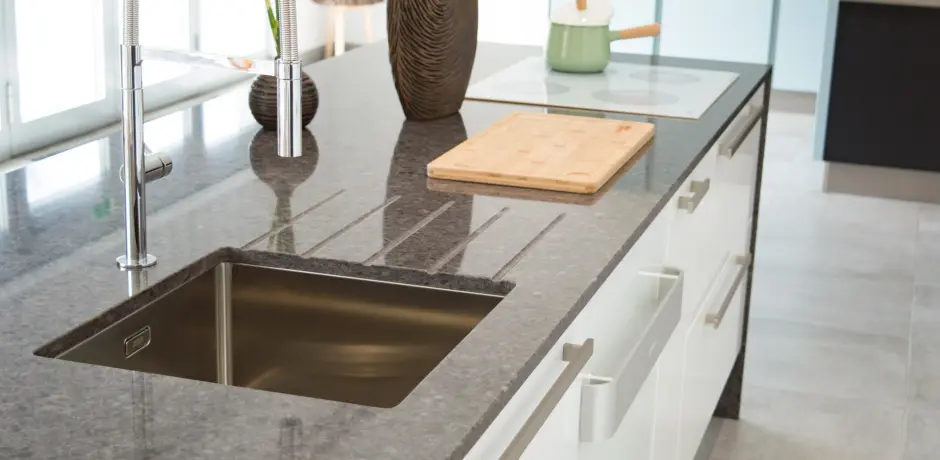 Composite material is not plastic. Artificial stone contains 60-96% natural minerals bound by polymer resins. It should be noted that the ratio of components determines the final characteristics of the work surface.
Composite material is not plastic. Artificial stone contains 60-96% natural minerals bound by polymer resins. It should be noted that the ratio of components determines the final characteristics of the work surface.
Acrylic stone includes aluminum hydroxide and acrylic binders. Quartz agglomerate consists of quartz chips (up to 96%) and polyester resins. On one of the projects last spring, the client insisted on the "most natural" option — chose quartz with maximum mineral content.
Manufacturing technology affects durability. Not all manufacturers are equally honest.
Countertop Material Comparison: Acrylic vs Quartz
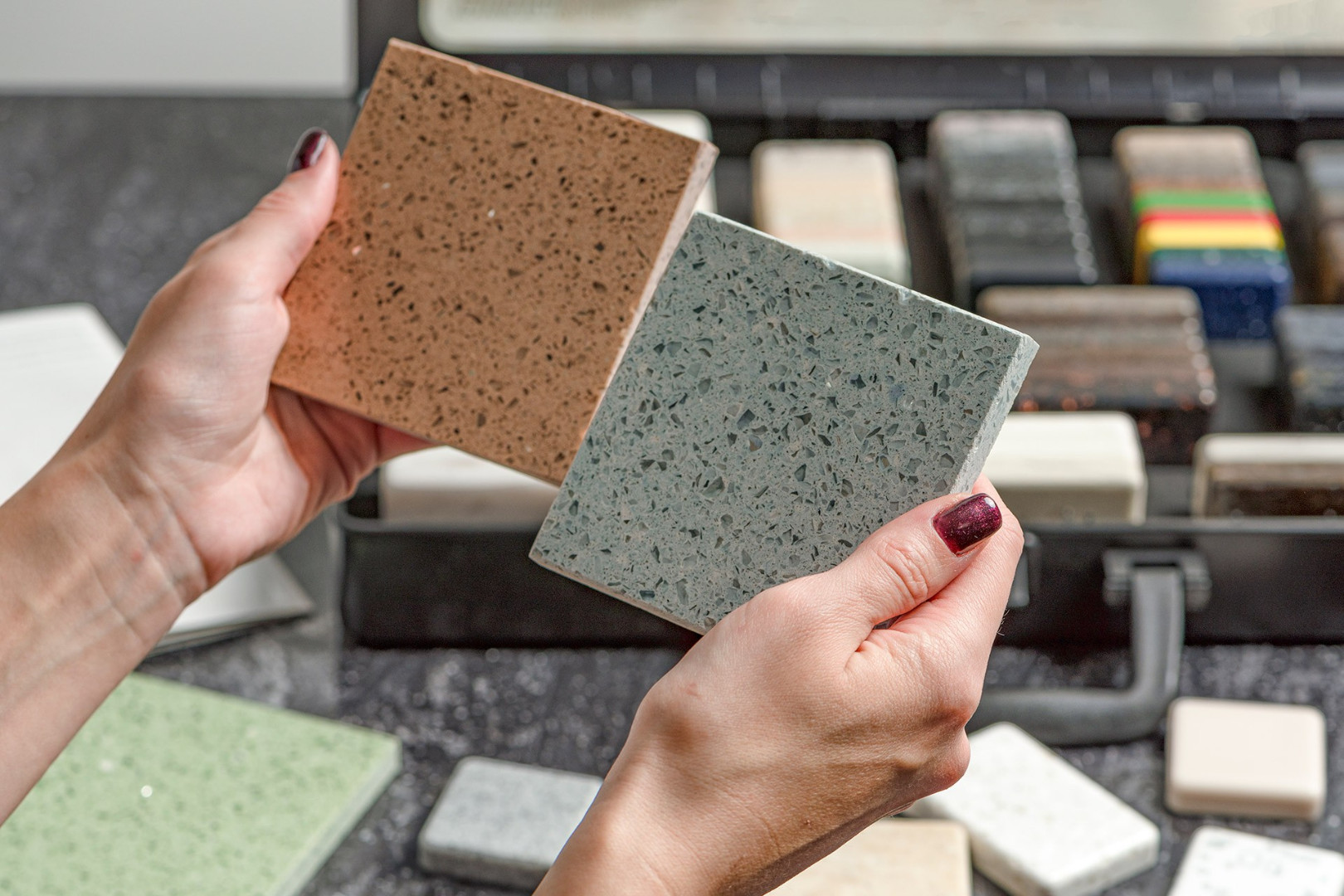 The choice between types of composite stone depends on operating conditions. Comparative analysis will help make an informed decision without costly mistakes in the future.
The choice between types of composite stone depends on operating conditions. Comparative analysis will help make an informed decision without costly mistakes in the future.
| Characteristic | Acrylic Stone | Quartz Agglomerate |
|---|---|---|
| Heat Resistance | Up to 180°C | Up to 200°C |
| Water Absorption | <0.03% | <0.1% |
| Repairability | Easy sanding | Complex repair |
| Maximum seamless length | 3.5 meters | 3.0 meters |
| Weight (kg/m²) | 18-25 | 55-65 |
| Maintenance complexity | Minimal | Minimal |
| Environmental friendliness | Average | High |
| Price per m² | $50-120 | $80-180 |
| Hardness (Mohs) | 2-3 | 6-7 |
Technical parameters clearly delineate the application areas of each countertop material. It is known that the right choice at the design stage minimizes risks and additional costs during operation.
Benefits of Artificial Stone for Kitchen
Composite material surpasses natural analogues in key parameters. A stone countertop made of synthetic components solves problems that have bothered owners of natural granite and marble for years.
A moisture-resistant countertop does not require seam sealing due to water absorption of less than 0.1%. A heat-resistant countertop withstands short-term contact with hot dishes up to 180-200°C. It should be noted that prolonged exposure to high temperatures can lead to material deformation.
Thus, the key advantages of artificial stone for kitchen countertops include:
- Hygiene — non-porous structure blocks bacterial and mold growth
- Countertop wear resistance — calculated service life of 15-25 years under intensive use
- Easy stone countertop care — regular soap solution and soft sponge are sufficient
- Design possibilities — any custom countertop shapes and colors for individual projects
These characteristics make composite stone a universal solution for modern kitchens. On one of last season's projects, we installed a white seamless countertop with an area of 12 m² — the result exceeded expectations of both the client and our team.
"When choosing countertop material, consider the intensity of kitchen use. For families with children, I recommend quartz agglomerate - it withstands any loads without visible traces."
Composite Stone Limitations
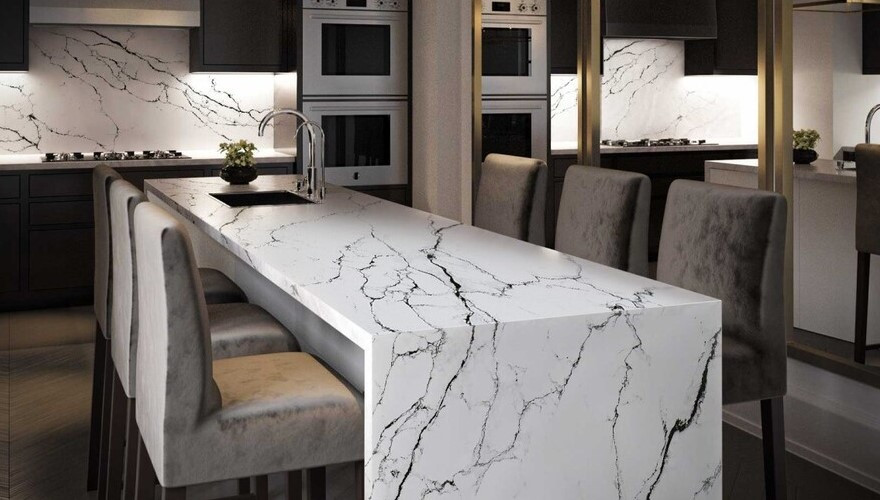 Honesty requires mentioning the material's weak points. Even the highest quality artificial composite has operational limitations that are important to consider when planning a kitchen.
Honesty requires mentioning the material's weak points. Even the highest quality artificial composite has operational limitations that are important to consider when planning a kitchen.
Taking into account the material's design features, the main disadvantages of composite stone include:
- Sensitivity to extreme temperatures (especially relevant for acrylic surfaces)
- Possibility of micro-scratches when carelessly handling abrasive objects
- High cost of branded solutions from leading manufacturers
- Limited color palette in the budget segment of countertop materials
Understanding these nuances helps properly operate the work surface. Disappointments can be avoided.
Composite Material Characteristics
Artificial stone durability depends on composition and manufacturing technologies. Quality material serves for decades without losing original properties. Acrylic stone density is 1.7 g/cm³ versus 2.4 g/cm³ for quartz agglomerate.
Significant difference in material weight affects requirements for load-bearing structures. It is known that installing heavy quartz may require reinforcing the kitchen furniture frame with additional stiffening ribs.
Water absorption is less than 0.03% for acrylic and less than 0.1% for quartz. Stain resistance is high for both materials. Not always perfect. But practical.
How to Choose a Kitchen Countertop: Practical Criteria
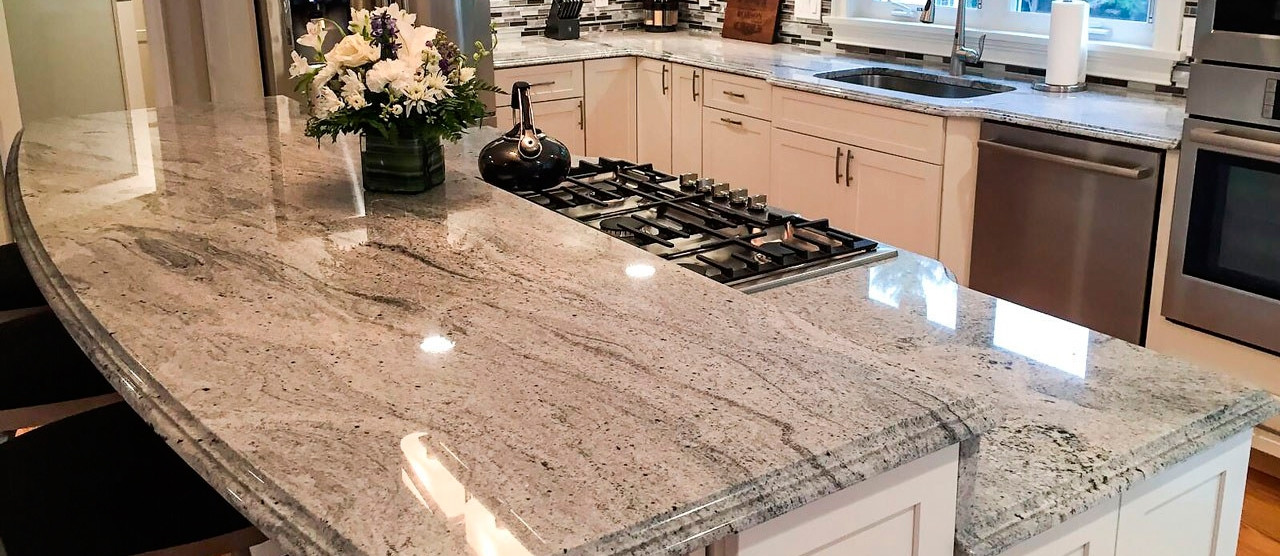 The decision depends on the family's lifestyle and financial capabilities. Active cooking requires especially durable countertop material capable of withstanding intensive loads without visible wear.
The decision depends on the family's lifestyle and financial capabilities. Active cooking requires especially durable countertop material capable of withstanding intensive loads without visible wear.
For families with children, quartz agglomerate is optimal. Baking enthusiasts will highly appreciate the increased heat resistance of composite material. Considering the design features of kitchen furniture, it's important to account for the weight of the chosen stone countertop — not all bases will support heavy quartz.
When choosing an artificial stone countertop, it's important to consider key factors:
- Kitchen use intensity and number of people cooking simultaneously
- Budget for countertop material and professional installation
- Design requirements for stone countertop and overall interior style
- Load-bearing capacity of the base and possibility of reinforcement
Proper evaluation of these criteria will help choose optimal composite stone. In one of recent projects, clients ignored weight recommendations — emergency frame reinforcement was required.
Step-by-Step Algorithm for Choosing Countertop Material
A structured approach saves time and minimizes errors. A simple scheme will help make a balanced decision without consulting multiple specialists and studying technical documentation.
Sequence for choosing countertop material:
- Determine budget — from $50 to $180 per m² including installation
- Assess cooking intensity — daily or weekends only
- Decide priority: maximum durability or design flexibility
- Check load-bearing capacity of kitchen furniture base cabinets
- Choose between acrylic (plasticity) and quartz (wear resistance)
This algorithm helps structure the decision-making process. Saves time on choosing the optimal solution.
Common Mistakes When Choosing Composite Stone
Forewarned is forearmed. Avoiding problems is helped by studying typical buyer mistakes that lead to unjustified expenses and subsequent disappointment in the material.
Common mistakes when buying artificial stone countertops:
- Choosing exclusively by price without considering composite material quality and manufacturer reputation
- Ignoring material weight when planning kitchen furniture construction
- Incorrect assessment of own stone countertop care needs
- Purchasing without checking quality certificates and compliance with building standards
Attention to these nuances saves money and nerves. In practice, I often notice: most problems arise precisely from hasty decisions at the selection stage.
Checklist: Questions for Countertop Suppliers
Competent questions reveal contractor professionalism. Proper dialogue with suppliers will help choose a reliable partner and quality countertop material without unpleasant surprises during work.
Mandatory questions when ordering kitchen countertops:
- What percentage of mineral components is in the chosen composite stone composition?
- Do you provide written warranty on material (10-15 years) and installation (2-5 years)?
- Are professional measurement and stone countertop installation included in the final cost?
- Do you have quality certificates, sanitary-hygienic conclusions and fire safety documents?
- What are the base requirements (flatness ±2mm per 2m length)?
- Are expansion joints provided for countertops longer than 3 meters?
Honest and detailed answers are a sign of a reliable company. Evasiveness should be concerning.
"When choosing between acrylic and quartz, consider your habits. If you often cook hot dishes and place cookware directly from the stove, quartz is irreplaceable. For decorative kitchens, acrylic will do."
Technical Installation Requirements
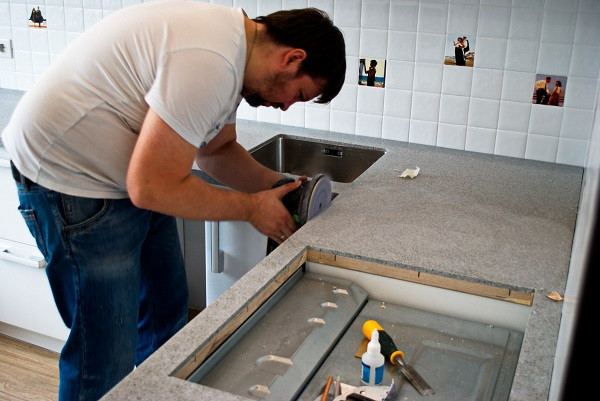 Professional installation determines countertop longevity. Installation quality affects operational characteristics no less than the countertop material properties themselves.
Professional installation determines countertop longevity. Installation quality affects operational characteristics no less than the countertop material properties themselves.
Key technical requirements for the base:
- Surface flatness: deviations no more than ±2mm per 2 meters length
- Structure rigidity: additional reinforcement ribs for quartz weighing more than 50 kg/m²
- Expansion joints: mandatory for countertops longer than 3 meters
- Material acclimatization: 24 hours in installation room at temperature +18-22°C
Violating these requirements leads to deformations and reduced service life. In one project, ignoring base flatness requirements led to cracks appearing after 8 months of operation.
Composite Stone Countertop Care
Proper care extends material service life by years. A hygienic countertop remains so when following elementary rules that don't require special knowledge or expensive products.
According to The Spruce experts, there are basic principles for stone countertop care (source):
- Immediately remove spilled liquids, especially staining ones (wine, coffee, juices)
- Use heat-protective stands under hot cookware and electrical appliances
- Use exclusively non-abrasive products for cleaning composite material
- Regularly perform wet cleaning with mild cleaning compounds
Following these rules guarantees artificial stone longevity. It should be noted that even the highest quality composite requires careful handling — this is a long-term investment that pays off only with proper operation.
For professional countertop installation, it's recommended to study technical guides, such as the DoItYourself installation manual (source). Custom countertops require precise measurements and professional installation approach.
"We installed an acrylic stone countertop two years ago. Not a single stain, not a scratch. Children constantly spill something, but the surface remains perfect. The sink is integrated so that seams are completely invisible. Best kitchen investment in recent years."
Conclusion: Practical Recommendations
Choosing an artificial stone countertop is an investment in kitchen comfort and functionality for decades ahead. The right decision requires a comprehensive approach and consideration of many factors.
Key recommendations for successful selection:
For active kitchen users — prefer quartz agglomerate. Its strength and heat resistance will pay off the additional costs through years of trouble-free operation.
For decorative kitchens — acrylic stone will provide more design possibilities at lower costs. Seamless surface will create a monolithic effect.
With limited budget — choose proven manufacturers in the mid-price segment. Saving on material quality will result in additional repair costs.
Definitely consider the kitchen furniture's load-bearing capacity. Heavy quartz may require structural reinforcement, which will increase the overall project cost.
Thus, artificial stone for countertops remains the optimal choice for modern kitchens. The main thing is to approach the choice consciously, considering technical characteristics, operating conditions, and long-term usage prospects.
Remember: a quality composite stone countertop with proper care will serve 15-25 years, justifying every dollar spent with daily use convenience.
